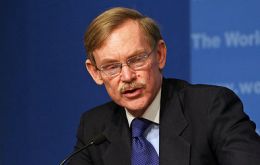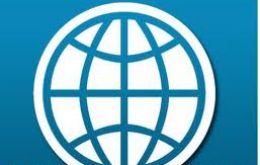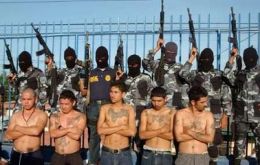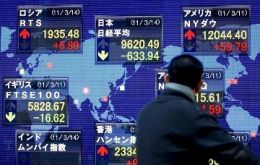MercoPress. South Atlantic News Agency
Tag: World Bank
-
Wednesday, July 20th 2011 - 06:54 UTC
Zoellick calls for strong US leadership to revive moribund world trade talks

US leadership could be the vital spark needed to revive moribund world trade talks, said World Bank President Robert Zoellick and criticized those who support a mini-trade deal or putting the Doha effort to sleep.
-
Saturday, June 11th 2011 - 10:47 UTC
Hillary Clinton denies pursuing the post of World Bank President

US Secretary of State Hillary Clinton said she was not in discussions over the top job at the World Bank and that she was not pursing the post. Clinton is in Zambia as part of a five-day Africa trip that is being overshadowed by news that she had expressed interest in moving to head the World Bank.
-
Tuesday, May 17th 2011 - 23:31 UTC
US dollar status as world’s single reserve currency will end by 2025

The United States dollar status as the world’s single reserve currency will end by 2025, according to a new report by the World Bank.
-
Friday, April 15th 2011 - 05:35 UTC
Developing nations reject IMF rules on capital inflows controversy

Developing nations warned the IMF on Thursday against imposing new rules dictating how they manage capital inflows rushing into their economies, suggesting rich nations take a hard look at their own policies instead.
-
Thursday, April 14th 2011 - 23:50 UTC
Mercosur outperformed in 2008/09 recession and during 2010 recovery

Latin America and the Caribbean have weathered the 2008-2009 recession much better than it had previous downturns. However less well-known is that the region, particularly Mercosur members, also decisively outperformed many other regions during the same period with a decline in growth smaller than that of the middle-income country average and with a rebound that was swifter and stronger.
-
Thursday, April 14th 2011 - 22:57 UTC
Latam’s challenge: combating inflation but also the inflow of speculative capital

Strong public and private consumption, abundant credit and strong currency appreciation among other reasons helped Latin American countries overcome the 2008/09 recession and outperform other regions according to the World Bank report Latin America and the Caribbean’s Success Put to the Test.
-
Thursday, April 14th 2011 - 21:01 UTC
More people deeper in poverty as food prices soar 36%, says World Bank

Driven in part by higher fuel costs connected to events in the Middle East and North Africa, global food prices are 36% above their levels a year ago and remain volatile, pushing people deeper into poverty, according to new World Bank Group numbers released Thursday.
-
Monday, April 11th 2011 - 20:34 UTC
Crime and violence cost Central American countries 8% of GDP, says World Bank

Growing crime and violence in Central America not only have an immediate human and social toll but they also pose a tremendous threat to development potential in the region since it is estimated that these sources of instability cost 8% of GDP, once health, institutional, private security, and material expenses are accounted for.
-
Tuesday, March 29th 2011 - 18:08 UTC
World Bank says Latam has capacity and potential to help solve global food crisis

Latin America can help solve the global food crisis by expanding farm production, the World Bank said this weekend, and Colombia said it was on board with plans for an 'agricultural revolution'.
-
Tuesday, March 22nd 2011 - 08:15 UTC
World Bank forecasts Japanese economy will begin recovering at the end of 2011

Japan's devastating earthquake and tsunami will depress growth briefly before reconstruction kicks off and gives the beleaguered economy a boost, the World Bank said in a report.
